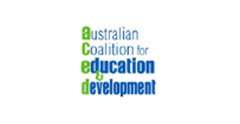Adult Learning Australia is calling for a federal government that supports and funds high quality adult education programs that are responsive to community need and make Australia a fairer place for everyone.
Everyone should have access to quality adult education when they need it.
Opportunities to continue to learn throughout our lives are essential — not just for a more knowledgeable workforce — but for our physical and mental well-being, the health of our communities, and for a just and democratic civil society.
See our #AdultEd4All campaign media release.
#AdultEd4All
Endorsed by:
 |
 |
 |
 |
 |
 |
 |
 |
What we want
Adult community education (ACE) provides a ‘second chance’ to many Australians so they can reach their full potential. Regardless of financial or personal circumstances, we should all be able to access quality adult education when we need it.
Inclusive community-based education
Education does not and should not finish with school or university. Every Australian who did not complete school or whose education has been disrupted or cut short deserves a second chance to learn. People who have not benefited from our formal education system or who are socially and economically marginalised have the most to gain from adult community education because it offers pathways to further education and training; helps to break the cycle of poverty and disadvantage and enables people to participate fully in their communities and as citizens in a democratic society.
The Australian government must recognise the significant role of adult community education through a renewed Ministerial Declaration and national policy framework that enables accessible and inclusive adult community education to flourish across all states and territories; particularly small providers in rural and regional areas.
The Australian government should also allocate resources that enable ALA to undertake specific ACE research to map the ACE sector to better inform government policy and decision making and the community.
The Australian government must commit to developing and resourcing a national adult literacy strategy that is guided by a broader cross-departmental lifelong learning policy and establishes a framework for increasing the levels of adult literacy by 20% at PIAAC 2031/32.
A national strategy
Adults with low language, literacy, numeracy, and digital skills (LLND) are less likely to be employed or more likely to be employed in low-skilled insecure work. They are at greater risk of redundancy leaving them vulnerable in an age when literacy demands in the workplace are rising.
Living with low literacy diminishes a person’s quality of life, ability to participate, self-esteem, and job prospects. People with low LLND skills are also less likely to participate in job-related education and training. Improving people’s literacy skills on the job benefits both employees and businesses through improved flexibility and productivity.
The ACE sector plays a crucial role in efforts to improve adult LLND skills by offering flexible, place-based accredited and non-accredited education programs.
A national adult literacy strategy should include funded commitments in line with the recommendations from the Standing Committee on Employment, Education and Training’s Inquiry into adult literacy and its importance. The strategy must include:
- a comprehensive audit of adult LLND education programs around Australia, including non-accredited LLND programs, and which identifies and evaluates effective interventions that target socially and economically marginalised Australian communities, including culturally and linguistically diverse communities
- a framework that ensures programs in Aboriginal and Torres Strait Islander communities are developed and delivered in ways that are consistent with the National Agreement on Closing the Gap
- a national marketing strategy that de-stigmatises adult literacy and numeracy issues in the community and influence national attitudes and behaviours
- collaboration with the states and territories and key community stakeholders.
Adult educators need access to free high quality professional development that provides them with opportunities to learn in ways that are applicable to their work settings.
High quality professional development
Australia is suffering from a national skills shortage of educators that are qualified to support adults with low language, literacy numeracy, and digital (LLND) skills. The adult LLND workforce is largely casualised; therefore, adult educators need access to free high quality professional development that provides them with opportunities to learn in ways that are applicable to their work settings.
Adult educators need networks, resources, and professional development that provide pathways into the field and give them access to initial training and ongoing professional development enabling them to provide the best experiences for the people in their programs.
With sufficient resources, Adult Learning Australia can deliver high quality professional development that builds the capacity of the workforce, including both professionals and volunteers.
A lifelong learning policy must be a national priority and a centrepiece for all educational policies in order to unlock the true potential of all Australians.
Equitable access to learning
Australia needs a long term approach to lifelong learning which recognises all learning and the relationship between informal, non-formal and formal learning using a whole of government approach, and which places the learner at the centre. Equitable access to learning requires a lifecycle perspective. Under-served groups must be a priority.
Equally important is the quality of opportunities – diverse learning methods, courses, and settings, particular community settings, that cater for multiple learning needs, and the appropriate resources to support them.
A lifelong learning policy should be developed and implemented as the centrepiece of all education policies in order to provide opportunities for Australians to adapt to the changing economic and social landscape. A lifelong learning policy would also acknowledge learning beyond employment and re-skilling and highlight ACE’s role in social mobility, community building, and wellbeing.
Australia needs a genuine commitment from the Australian government to meet the UN Sustainable Development Goals 2030 and genuine engagement with the ACE sector to ensure they are working towards those goals.
Action on equity
Australia is a signatory to the United Nations 2030 Agenda for Sustainable Development which includes 17 Sustainable Development Goals for 2030 and beyond. Goal Four is the education goal, which aims to ‘ensure inclusive and equitable quality education and promote lifelong learning opportunities for all. Australia is also a member of the United Nations Educational, Scientific and Cultural Organization (UNESCO), which has held International Conferences on Adult Education, known as ‘CONFINTEA’, every 12 years since 1949.
The seventh International Conference on Adult Education (CONFINTEA VII) will be hosted by Morocco in June 2022. The conference will examine effective adult learning and education policies from a lifelong learning perspective and within the framework of the UN Sustainable Development Goals (SDGs). Conference participants will develop a new framework for action on adult learning and education that will replace the Belém Framework for Action, adopted at CONFINTEA VI in 2009.
To achieve the SDGs, we need a transparent and participatory policy making process that includes consultation with all stakeholders, including not for profits and civil society, to ensure that no one is left behind.
The Australian government should engage with the not-for-profit sector and civil society in the review and reporting on SDG4 Education and Lifelong Learning.
As a signatory to the Belém Framework for Action and the SDGs, the Australian Government should send a delegation to CONFINTEA VII to ensure a genuine commitment to meet the Belém Framework for Action and the UN Sustainable Development Goals 2030.
Party positions
 |
Response from the Australian Labor Party – Election 2022.
|
  |
Response from the Liberal National Party – Election 2022. |
 |
Response from The Greens – Election 2022. |
Get involved
Quick and easy actions you can take
 Social sharing
Social sharing
- Share posts on social media about your organisation or your learners’ experience with ACE and why #AdultEd4All matters.
Call talkback
- Text or call your local talkback station, especially when political candidates are being interviewed.
Email the editor
- Email or write to the editor of your local paper. This is a great way to bring attention to adult education in your community and the importance of #AdultEd4All.
Contact candidates
- Get in touch with your local political candidates.
- Send them a message about why #AdultEd4All is important to you/your organisation by:
-
- Sending them a message on social media
- Writing them an email
- Calling their office
- Requesting a meeting
- Attending scheduled community events where you might have the opportunity to ask them a question
Links and downloads
Find out more.
- ALA’s Pre-budget Submission 2022–23
- Australian Adult Community Education Environmental Scan
- ALA submission to the House Standing Committee on Employment, Education
and Training inquiry into adult literacy, numeracy and problem-
solving skills in Australia - UNESCO Belam Framework For Action
- United Nations Sustainable Development Goals
Download ALA’s Election 2022 priorities.
